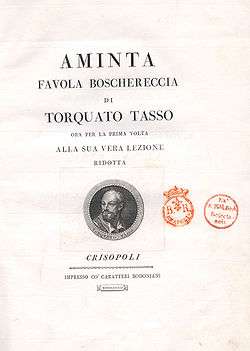Aminta

Aminta is a play written by Torquato Tasso in 1573, represented during a garden party at the court of Ferrara. Both the actors and the public were noble persons living at the Court, who could understand subtle allusions the poet made to that style of life, in contrast with the life of shepherds, represented in an idyllic way.
The text is written in hendecasyllabic and septenary verses; it is divided into five acts.
The play has a pastoral theme, and is set in the time of Alexander the Great. The characters are shepherds and nymphs.
The story is about Aminta's love for the beautiful nymph Silvia, who does not return his attentions and prefers hunting. She risks rape at the hands of a Satyr but Aminta saves her; however, again she flees from him. Aminta, finding her blood-stained veil, attempts to kill himself. Now Silvia is remorseful, comes back to cry over Aminta's body who is still alive, and the two can happily marry, following the advice that older and wiser friends had been giving them.
It was the basis for several opera librettos, such as:
- the libretto by Metastasio on which Mozart based his opera Il re pastore (Salzburg, 1775)
- the libretto by Metastasio on which Antonio Mazzoni based his opera Aminta, il re pastore (Madrid, 1756)
- the plot of Delibes' ballet Sylvia, as re-written by Jules Barbier (Paris, 1876).
Recording
A phonautogram of this play's opening lines is the oldest known audible record of human speech as of May 2009.[1]
Sources
- Tasso, Torquato (1820) [1573]. Amyntas, A Tale of the Woods. trans. Leigh Hunt. London: T. and J. Allman.
See also
- Sir Frederick Ashton's ballet Sylvia
External links
- Tasso's Aminta, translation (with introduction) by Malcolm Hayward
- The Grand Hotel Aminta was named after the poem of Torquato Tasso who was born in Sorrento